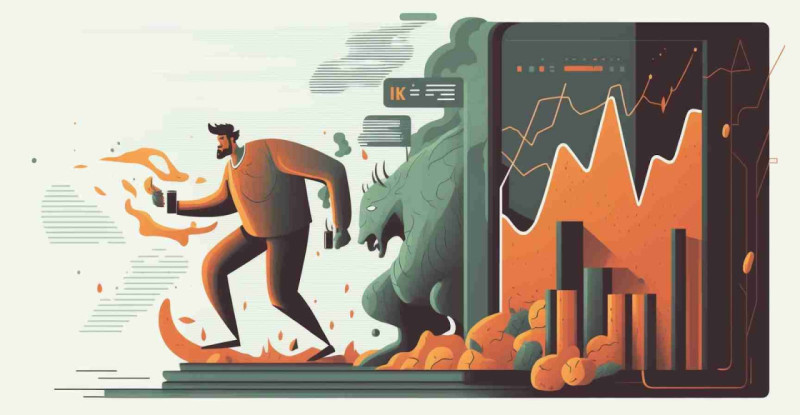
What Is the Average Income of a Forex Trader?
Forex trading has become an increasingly popular way to make money in recent years. Many people are drawn to the idea of trading currencies and potentially earning large profits. However, it is important to have a realistic understanding of the average income of a forex trader before jumping into the world of forex trading.
The truth is that the average income of a forex trader varies greatly and is difficult to determine. While some traders may earn millions of dollars per year, the majority of forex traders earn a modest income. According to a survey conducted by DailyFX in 2020, the average forex trader earns around $50,000 per year. This is a median figure, meaning that half of all traders earn more than $50,000 and half earn less.
It's worth noting that this figure is not a reflection of what traders earn in their first year of trading. In fact, many traders may not earn any income at all in their first year as they learn the ropes and develop their trading strategies. Additionally, some traders may experience losses rather than gains in their early years.
The income of a forex trader is influenced by a number of factors, including the trader's experience, trading style, risk tolerance, and the size of their trading account. Traders who are experienced and have a solid track record of success are likely to earn more than those who are just starting out. Additionally, traders who take on higher levels of risk may earn more but also face the potential for larger losses.
In conclusion, while the average income of a forex trader may be around $50,000 per year, it is important to remember that this is a median figure and that earnings can vary greatly. It takes time, dedication, and a willingness to learn to become a successful forex trader. If you are considering forex trading as a career or a side income, it is important to do your research and understand the risks and potential rewards involved.
How Much Can You Expect to Earn as a Forex Trader?
Forex trading is a popular activity that attracts people looking to earn money by trading currencies. However, the question of how much one can expect to earn as a forex trader is complex and difficult to answer definitively.
The income of a forex trader depends on several factors, including their experience, trading style, risk management skills, and the size of their trading account. Generally speaking, experienced traders who have developed a profitable trading strategy and a solid track record can earn more than novice traders.
On average, a successful forex trader can earn anywhere from $50,000 to $250,000 or more per year. This range is broad because there are many variables that can affect a trader's earnings, including market conditions, geopolitical events, and the availability of trading opportunities.
It's important to note that forex trading is not a get-rich-quick scheme, and there are no guarantees of profit. In fact, most traders experience losses at some point in their trading journey. To be a successful forex trader, one must be disciplined, patient, and willing to continuously learn and adapt to the ever-changing market conditions.
The amount of money a trader can earn also depends on their trading style. For instance, a day trader who trades frequently and takes on high-risk trades may earn more than a swing trader who holds positions for longer periods of time and takes on less risk. Ultimately, it's up to the trader to determine their preferred style and approach.
In conclusion, how much you can expect to earn as a forex trader depends on a variety of factors. While experienced traders can earn a substantial income, it's important to keep in mind that success in forex trading requires hard work, discipline, and a willingness to learn and adapt.

What Is the Salary of a Forex Trader?
The salary of a forex trader is a topic of interest for many individuals who are considering a career in trading currencies. However, unlike traditional salaried positions, the salary of a forex trader is not fixed and can vary greatly based on a number of factors.
Firstly, it's important to understand that forex traders are not typically paid a traditional salary. Instead, they earn their income through trading profits. The amount of profit a trader can make depends on several factors, including their trading strategy, risk management skills, market conditions, and the amount of capital they have to invest.
Generally speaking, experienced and successful forex traders can earn significantly more than novice traders. According to a survey conducted by DailyFX in 2020, the top 10% of forex traders earned an average of $277,000 per year, while the bottom 10% earned an average of $10,000 per year.
However, it's important to note that not all traders earn a consistent income year after year. The forex market is volatile and unpredictable, and traders must be able to adapt to changing market conditions. Some traders may have years of high profits followed by years of losses, while others may experience consistent profits year after year.
Additionally, a trader's income can be affected by the size of their trading account. Traders with larger accounts are able to take on larger trades and potentially earn more profits. However, they also face greater risks and potential losses.
In conclusion, the salary of a forex trader is not fixed and can vary greatly depending on a number of factors. Experienced and successful traders can earn substantial profits, but they must be disciplined, patient, and willing to continuously learn and adapt to the ever-changing market conditions.
How Do Successful Forex Traders Earn a Living?
Successful forex traders earn a living by generating profits from trading currencies. While there is no one-size-fits-all approach to forex trading, there are several key strategies and techniques that successful traders use to generate consistent profits.
One of the most important factors in earning a living as a forex trader is having a solid trading plan. A trading plan should include a detailed strategy for entering and exiting trades, as well as risk management techniques for minimizing losses. Successful traders often have a set of rules or guidelines that they follow, which helps them stay disciplined and avoid emotional trading decisions.
Another important factor in earning a living as a forex trader is having a deep understanding of the market. Successful traders analyze market trends and use technical analysis to identify potential trading opportunities. They may also stay up-to-date on global economic news and events that could impact currency values.
Risk management is also crucial for successful forex traders. Traders must be able to manage their risk exposure and limit their potential losses. This may involve setting stop-loss orders or using other risk management techniques to minimize losses.
Successful traders may also use leverage to increase their potential profits. Leverage allows traders to control larger positions with a smaller amount of capital. However, leverage also increases the potential for losses, so traders must be careful when using it.
Finally, successful forex traders often have a long-term perspective and are willing to be patient. They understand that trading profits can fluctuate from month to month, and may be willing to ride out short-term losses in order to achieve long-term gains.
In conclusion, successful forex traders earn a living by generating consistent profits from trading currencies. They have a solid trading plan, a deep understanding of the market, and use risk management techniques to minimize losses. They may also use leverage to increase their potential profits, but are disciplined and patient in their approach to trading.

What Are the Best Gifts for Forex Traders?
If you're looking for a gift for a forex trader, it's important to choose something that will be both practical and appreciated. Here are some of the best gifts for forex traders:
- Trading Journal: A trading journal is a great tool for any forex trader. It allows them to track their trades, analyze their performance, and identify areas for improvement. There are many different types of trading journals available, from simple notebooks to more advanced software programs.
- Trading Books: There are countless books on forex trading available, covering everything from basic concepts to advanced trading strategies. Consider gifting a book that aligns with the trader's experience level and interests.
- Trading Course: A comprehensive trading course can be a valuable gift for a forex trader. It can provide them with in-depth knowledge and training, and help them develop a profitable trading strategy.
- Trading Software: Trading software can help traders automate their trades, analyze market trends, and identify potential opportunities. There are many different types of trading software available, ranging from basic charting tools to advanced trading platforms.
- Trading Gadgets: There are a variety of gadgets and tools that can make trading easier and more efficient. Some popular options include ergonomic keyboards, multiple monitors, and noise-cancelling headphones.
- Forex-themed Apparel: Forex traders may appreciate apparel with forex-related graphics or slogans, such as t-shirts or hats with currency symbols or trading-related quotes.
- Gift Cards: If you're unsure what to get a forex trader, consider a gift card to a trading-related website or service. This allows them to choose something that meets their specific needs and interests.
In conclusion, there are many great gift options for forex traders. Consider choosing something that aligns with their trading style, experience level, and interests, and that will be both practical and appreciated.
How to Calculate Your Potential Income as a Forex Trader: Tips and Tricks
As a forex trader, it's important to have an understanding of your potential income. While there is no guaranteed income in forex trading, there are several ways to calculate your potential earnings and manage your risk. Here are some tips and tricks for calculating your potential income as a forex trader:
- Understand Pips and Lot Sizes: Pips are the smallest increment in currency pairs, and lot sizes determine the size of your trades. Understanding how these two factors work together is essential for calculating potential profits and losses.
- Use a Pip Calculator: There are many online pip calculators that can help you determine the potential profits or losses of a trade. Simply input the currency pair, lot size, and pip value, and the calculator will do the rest.
- Consider Leverage: Leverage allows traders to control a large amount of currency with a relatively small investment. However, leverage also increases the potential for losses. Be sure to use leverage responsibly and calculate your potential gains and losses accordingly.
- Keep a Trading Journal: Keeping a detailed trading journal can help you track your profits and losses, and identify patterns and trends in your trading. This information can be used to adjust your trading strategy and improve your profitability over time.
- Set Realistic Goals: It's important to set realistic income goals based on your trading strategy and experience level. Don't expect to become a millionaire overnight, but instead aim to generate consistent profits over time.
- Use Stop-Loss Orders: Stop-loss orders allow traders to limit their potential losses on a trade. Use them to manage your risk and protect your capital.
- Learn from your Mistakes: Forex trading is a learning process, and losses are inevitable. Use your losses as an opportunity to learn from your mistakes and adjust your trading strategy accordingly.
In conclusion, calculating your potential income as a forex trader requires an understanding of pips, lot sizes, leverage, and risk management techniques. Use online calculators, keep a trading journal, set realistic goals, and learn from your mistakes to improve your profitability over time.

What Are the Key Factors That Affect the Income of Forex Traders?
Forex trading can be a lucrative venture, but it's important to understand the key factors that can affect the income of forex traders. Here are some of the most important factors to consider:
- Trading Strategy: Your trading strategy will have a significant impact on your potential income as a forex trader. A successful strategy should be based on sound technical and fundamental analysis, and should be adjusted over time based on market conditions.
- Risk Management: Managing your risk is essential for long-term success in forex trading. Traders should use stop-loss orders, position sizing, and other risk management techniques to protect their capital and minimize losses.
- Market Volatility: Forex markets can be highly volatile, which can lead to both significant gains and losses. Traders should be aware of market volatility and adjust their trading strategy accordingly.
- Leverage: While leverage can increase potential profits, it can also increase potential losses. Traders should use leverage responsibly and understand the risks involved.
- Market Knowledge: A deep understanding of forex markets, including economic indicators, geopolitical events, and market trends, is essential for success in forex trading.
- Trading Experience: Experience is key in forex trading, and traders should expect to make mistakes and learn from them over time. Novice traders should start with a small account and gradually increase their position size as they gain experience and confidence.
- Trading Costs: Trading costs, including spreads, commissions, and overnight fees, can significantly impact a trader's profitability. Traders should choose a broker with competitive trading costs and factor these costs into their trading strategy.
In conclusion, the income of forex traders is influenced by a variety of factors, including trading strategy, risk management, market volatility, leverage, market knowledge, trading experience, and trading costs. Successful traders will focus on these key factors and continually adjust their trading strategy based on market conditions and their own experience.
What Are the Best Online Resources for Tracking Forex Trader Salaries?
If you're interested in tracking forex trader salaries, there are several online resources available that can provide valuable information. Here are some of the best online resources for tracking forex trader salaries:
- Glassdoor: Glassdoor is a popular job search website that allows employees to anonymously share salary information for various job titles and industries, including forex trading. This can provide valuable insights into the salaries offered by different forex trading firms.
- Payscale: Payscale is another online resource that provides salary information for various job titles and industries, including forex trading. Payscale allows you to compare your salary to others in the industry, based on factors such as job title, experience level, and geographic location.
- Indeed: Indeed is a job search website that allows users to search for forex trading jobs and compare salaries offered by different firms. Indeed also provides salary estimates based on job titles and geographic location.
- TradingView: TradingView is a popular online platform for technical analysis and charting. It also provides access to a community of traders who share trading ideas and strategies, and may also share information about their salaries.
- Forex Trading Forums: There are several online forums dedicated to forex trading, where traders can discuss trading strategies, share information about job opportunities, and exchange information about salaries.
In conclusion, if you're interested in tracking forex trader salaries, there are several online resources available that can provide valuable information. Glassdoor, Payscale, Indeed, TradingView, and forex trading forums are all excellent resources for tracking forex trader salaries and gaining insights into the forex trading industry.
See also:
“Exploring Forex Market Open Hours and Depth During Holidays: July 4th and Thanksgiving"
















